Answer these simple questions and we will find you the BEST prices
Which type of solar quotes do you need?
It only takes 30 seconds
100% free with no obligation

Get up to 3 quotes by filling in only 1 quick form

Compare quotes and find yourself the best deal

Increase the value of your home by installing a new boiler
- Householdquotes.co.uk
- Boilers
- Leaking
Is Your Boiler Leaking Water? Guide On What To Do & Check

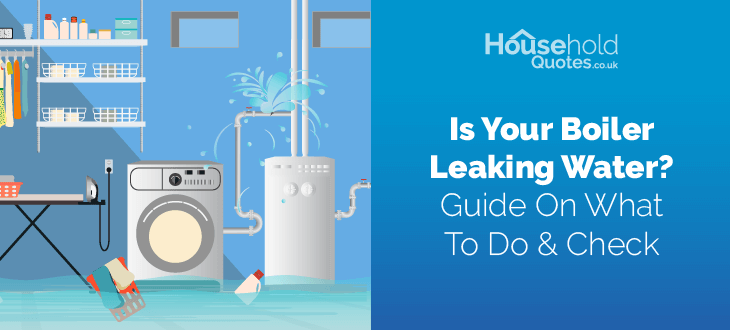
A boiler leaking water is not necessarily a major cause of concern, unlike a gas leak, which can be dangerous. But with boilers, it depends on where the water is leaking from, how much, and why. Boilers can start leaking in large amounts due to improper pressure settings, bad installation, corrosion, and a host of other reasons. This page will discuss these reasons and others in detail while also letting you know what you can do to prevent them.
It’s also worth considering that your boiler may be outdated or on its way out. In this case, you will need a new one and you’ll need to find a trustworthy installer to help you out. Ordinarily, finding a reliable boiler installer can take days of laborious research and price comparisons. If that sounds like something you don’t have the time for, we can help you out.
Our service can provide you with up to 3 free, non-binding quotes from trusted installers in your area who can help you navigate complex central heating prices. All you’ll have to do is fill out a 30-second form and we’ll handle the rest. Click the button below to get started.
- Quotes from local installers
- Payment by finance available
- Save up to £975
It only takes 30 seconds

- Is your boiler leaking water?
- Why is my boiler leaking water?
- Is a leaking boiler an emergency or can I still use it?
- Does a leaking boiler cause low pressure?
- Is a leaking boiler dangerous?
- Can you prevent your boiler from leaking?
- Why has my boiler suddenly stopped leaking?
- How to fix your leaking boiler?
- FAQ
Is your boiler leaking water?
Most boiler leaks are visibly apparent and they cause low water pressure and/or lack of hot water. There are different levels of leaks which might call for different measures, with small leaks being easy to fix (topping up the water pressure can be fine). These can be relatively easy, but larger leaks can be a major issue.
Large leaks can cause building damage and lead to unhygienic environments. With larger leaks, it’s best to turn off the water supply and call a repairman.
Water leaks don’t have to be a major, immediate problem, although gas leaks can be very concerning. In the case of a gas leak, you should be able to smell it and notice changes in your pilot light (depending on your boiler). If the coast is clear on these issues, you need not be too concerned.
If you do smell a gas leak or suspect one, you should immediately call 0800 111 999 (England) or 0800 002 001 (Scotland, Wales, and Northern Ireland).
Similarly, if you have an oil leak, make sure you close off your oil valve and gather up the remaining oil in a separate vessel (like a tub) before calling an emergency service. Oil leaks can be a major issue and may require a new boiler (which can be costly since oil boiler costs are higher for both installation and repair).
If it's only a water leak, there could be many reasons for it.
Why is my boiler leaking water?
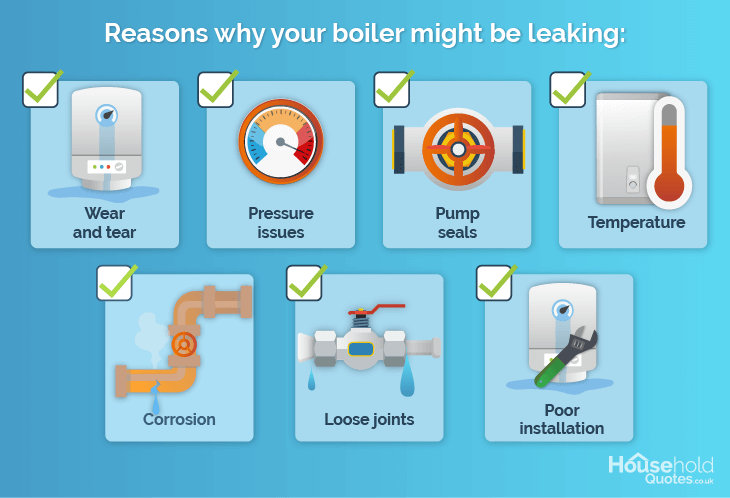
So, what do you do if your boiler is leaking water? That depends on the nature of the leak. First, you find the source since there are many usual suspects. Below we’ll discuss the most common issues that cause leaking water and what you can do about them in the short term and the long term (which usually involves calling a repair expert).
Wear and tear

In the event of a boiler leak, check for abrasions, cracks, and damages. Check various areas by covering every pipe and tube to rule out the usual suspects. You can use a cloth to clean up the area and see if the water reappears.
If the boiler is leaking water from the top, the issue could be a supply line up top or you may have a waterlogged expansion tank (this would not apply to a leaking combi boiler, since they don’t have an expansion tank).
When it comes to pipework, fastening the various quarter turns and fittings might be enough for lighter leaks. If this doesn’t work or you’re unsure how to do this, please call a professional. Not all wear and tear is as easy to repair. If your boiler is dripping water from the bottom, the pipes inside your boiler may have corroded. This happens to older boilers, often caused by oxygen in the water mixing with the metal to create oxides.
Similarly, wear and tear doesn’t just affect the boiler. If the cracks are in the body, the wall, or peripheral elements, you may need more extensive repairs.
Pressure
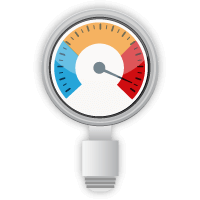
Experiencing pressure issues can mean that there may be a leak somewhere but not always. That said, this is one of the most common reasons for water dripping from boilers.
The outlet pipe is designed to let out some of the pressure, so it has a relatively less sealed design. Generally, this leads to a small drip but too much can be an issue. A larger level of water leakage from the pressure outlet pipe could mean your boiler is on a pressure setting that’s too high.
Check the pressure gauge needle and whether it’s pointing outside the appropriate range (usually indicated by a red zone). If the pressure gauge is outside an appropriate level, your radiators might need bleeding.
Pump seals
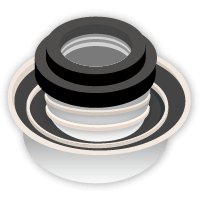
Pump seals help in preventing a water leak from a boiler. However, these seals are prone to damage over time and can cause leaks.
Damage to the seals can also lead to a boiler dripping water. After years of use, rubber seals harden or fall apart from continued use. This doesn’t only happen to older boilers, as running a new boiler on an overly powerful pressure setting can cause seal damage. It’s best to call a professional if you suspect this is the problem.
Temperature
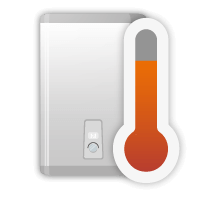
Temperature issues can come from several places. Loose joints, for example, can be less worrying than issues with the heat exchanger. The former requires checking all the joints in the system, as recommended earlier.
If the heat exchanger is damaged, that can be a really bad sign. This is the part of your boiler that takes heat from the hot gas to the water. That also makes it crucial and one of the more expensive parts to replace. They can corrode and split which causes some leakage. When this happens to an older model for which parts may not be as available, your best option is to replace your boiler.
Corrosion
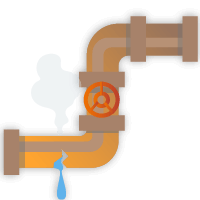
Boilers are designed to resist corrosion for most of their service lives, so corrosion can be indicative of deeper problems. Since boilers are sealed systems and corrosion or rust both require oxidation, this can mean that either air is leaking in, there is low alkalinity (imbalanced pH) in the water, or the temperatures are too high.
Pipe corrosion can be fixed but tank corrosion is usually a sign that the boiler has outlived its lifespan. Depending on what parts are rusting, this can be a complicated procedure. Either way, it’s best to contact a technician.
Loose joints
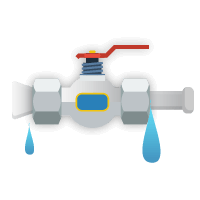
Due to how they operate, boilers contract and expand from temperature changes as they process hot and cold water. This can cause the joints to loosen or create gaps and leak water over time. It’s best to check all the fittings of the boiler and see whether tightening any of these elements makes a difference.
While loose joints are natural for boilers that have been operational for a long time, this can also happen in newer ones where improper installation can cause this (along with other possible issues).
Poor installation
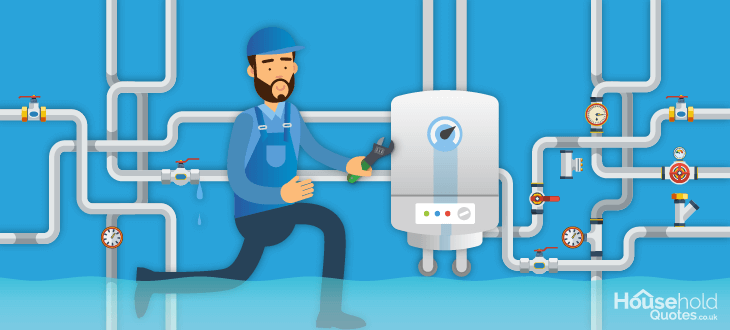
A standard boiler installation should include these elements:
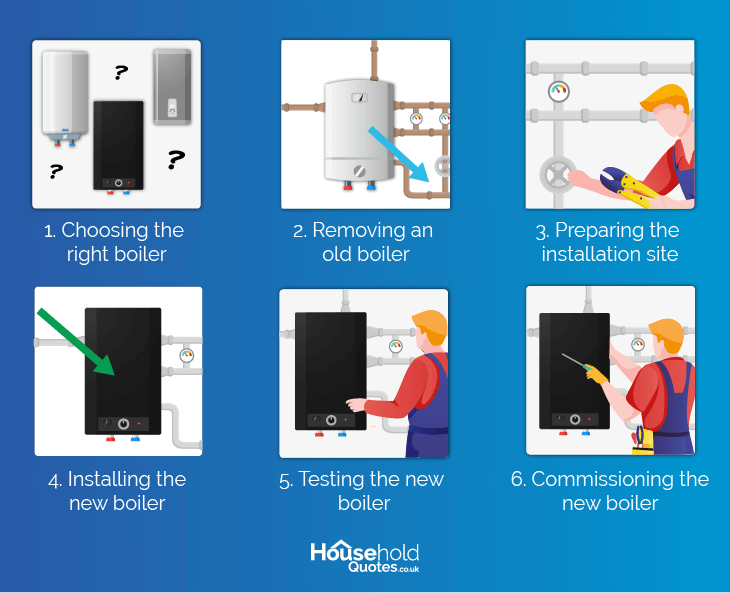
Signs of a poor installation include loose joints (as mentioned above), loose connections, bad pipe fittings, improper water circulation, low pressure, and the general signs of shoddy workmanship. In these cases, you should opt for a do-over or a refund if you can.
To avoid such issues you should find a Gas-safe registered engineer and (ideally) one you can trust. However, this is difficult as it can involve gruelling days of finding and assessing companies to figure out which have the right combination of best prices and reliable service. Luckily, we have a way to make this process far easier.
Our service can instantly provide you with up to 3 free, non-binding quotes from thoroughly vetted installers in our network. Compare multiple prices to see the ones that suit you the best and rest assured that you are getting what you paid for. All you need to do is click the button below and fill out a 30-second form.
- Quotes from local installers
- Payment by finance available
- Save up to £975
It only takes 30 seconds

Is a leaking boiler an emergency or can I still use it?
A leaking boiler can be an emergency based on the nature of the leak. If it is leaking gas or large quantities of water, you should immediately call for appropriate help. Gas leaks are imminent, so it's best to call a support line. In the case of water leaks, it’s best to turn off the boiler and any water line.
Once it has stopped expelling water, call a plumber or installer. There are many different types of leaks (as we outlined above) so it’s best to get a professional opinion on the extent of the issue. If the damage is critical, you may need to get an entirely new boiler.
If you want to know how much a new system or a certain brand can cost, you should check out our price pages:
Does a leaking boiler cause low pressure?
Yes. As water exits the boiler it can decrease the overall pressure. This can lead to a lack of hot water and central heating.
A leaking boiler can also be caused by high pressure as this can put too much of a strain on the boiler, so it’s good to try and decrease the pressure valve (and check the gauge) to see if it decreases the leakage.
Is a leaking boiler dangerous?
As mentioned previously, water leaks are not inherently dangerous but a gas boiler leak can release harmful chemicals. In the event of a gas leak, you should call a helpline. For water leaks, the biggest dangers are structural damage to your home and potentially unhealthy side effects. Of course, leaks can also cost a lot of money in terms of water usage.
Water damage can be mitigated by quickly turning the water off and putting down some towels. However, prolonged contact with water can ruin walls and floors. This can be especially bad for flats as it may bleed over to your neighbours and thus should be resolved promptly.
Another instance where it can be dangerous is if there are electric appliances around. Keep all sockets, outlets, and extensions away from potential leak areas.
If your boiler is leaking very frequently, you may need to buy a new one. A Gas-safe registered engineer can help you install a new one. Since finding a trustworthy installer can take numerous days of assessing companies and checking their offers, not everyone has the time for that. That’s why our service can be the best way to get the best prices from reliable professionals.
We can provide you with up to 3 free, non-binding quotes from thoroughly vetted installers in our network. Instantly receive the best prices in your area and pick the ones that suit you best with no effort on your part. Click the button below and fill out a 30-second form to get started.
- Quotes from local installers
- Payment by finance available
- Save up to £975
It only takes 30 seconds

Can you prevent your boiler from leaking?
To prevent a leaking boiler, an annual service is recommended (and often part of the conditions of your warranty) to keep your boiler in top shape. This can help prevent any issues with your system and keep your water flow in optimal shape. Even aside from leaks, it ensures that your efficiency is on par so that you aren’t paying excessively for gas or electricity.
Many boilers have error codes for potential leaks. Check your manufacturer's website or the boiler’s manual to find out which codes might be the most useful, as they can help detect it early.
Another way to prevent a boiler from leaking is to get stronger parts or buy one with stronger parts from the beginning. Stainless steel heat exchangers and similar parts can be better, for example. You can increase the lifespan of your boiler by obtaining parts less prone to corrosion.
Why has my boiler suddenly stopped leaking?
There are numerous reasons a leaking boiler may suddenly stop dripping water.
All in all, if you suspect a leak but it hasn’t happened since, it’s best to keep an eye on the boiler in case it might happen again.
How to fix your leaking boiler
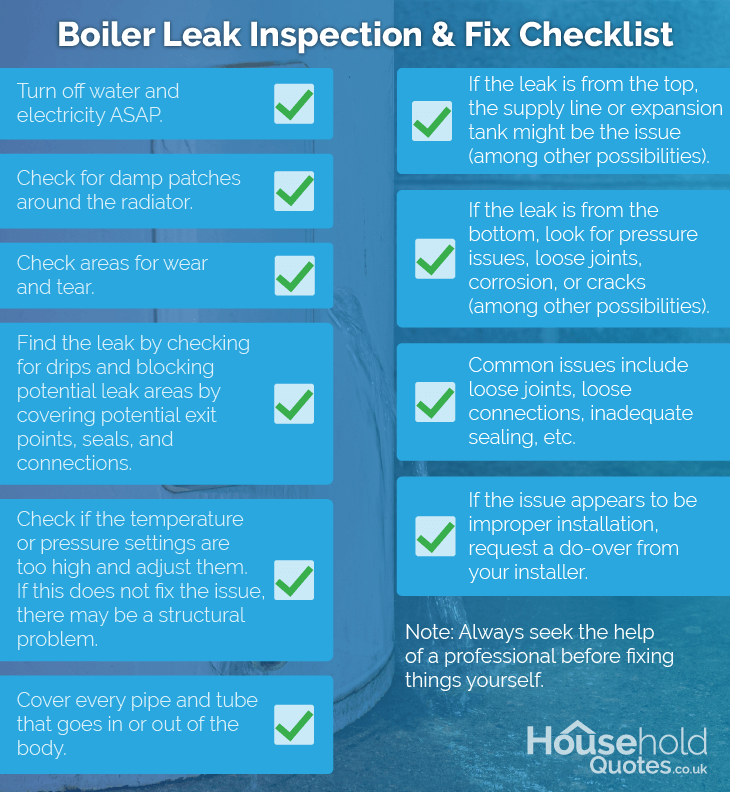
As this page illustrates, there are a bunch of fixes you can institute yourself for how to stop a boiler leak. However, it’s also best to know when to throw in the towel and call in a professional. There are a bunch of things you can do yourself, such as replacing a simple valve or tightening joints, but it’s best to get a second opinion before you do more damage.
In other cases, you might have to call it quits and install a new one. New boiler costs can be difficult to navigate on your own because each situation is different. In these cases, you’ll need the help of a reliable installer to procure the cheapest heating system at the right quality. Finding one on your own can be a strenuous task that involves days of cost comparisons and seeking out companies. That’s why we offer a better way.
Our service can provide you with up to 3 free, non-binding quotes from thoroughly vetted professionals. All you have to do is fill out a 30-second form and we’ll get you multiple quotes in no time. Click the button below and you can compare prices so you can pick the best ones.
- Quotes from local installers
- Payment by finance available
- Save up to £975
It only takes 30 seconds

FAQ
Turn it off ASAP and check for gas leaks. If the coast is clear, there are a number of component checks you can engage in or you can call an installer.
No. A boiler that is leaking gas can be dangerous. While one that leaks water may be less harmful, it can still cause water damage and other problems.
Water leaking from a gas boiler is not dangerous. This depends on how much and whether gas is leaking with it (which is the real danger). Some sources of water leaks are more serious than others.
The cost of repairing a boiler can range from around £100 to £500 on average (but it can cost way more). This depends on the kind of problem and which components are affected.
There are many reasons for a boiler leaking from below but the most common issues are pressure issues, loose joints, corrosion, or cracks. Although, there can be many more causes.
Temporarily, yes. In the long term, it’s best to identify the source and resolve the problem (ideally, with the help of a certified installer).

Rawal is an ex-tech journalist with a passion for sustainable innovations, green policies, and their adoption. With a straightforward writing style meant to be easily digested but full of handy tips, they are geared towards readers of all levels of familiarity with the technologies and home appliances covered.
- Is your boiler leaking water?
- Why is my boiler leaking water?
- Is a leaking boiler an emergency or can I still use it?
- Does a leaking boiler cause low pressure?
- Is a leaking boiler dangerous?
- Can you prevent your boiler from leaking?
- Why has my boiler suddenly stopped leaking?
- How to fix your leaking boiler?
- FAQ
